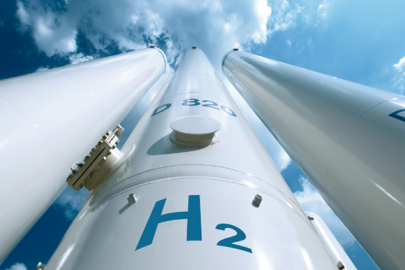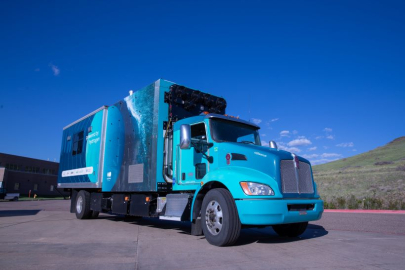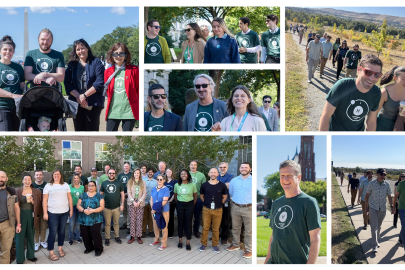Ready to help build our energy future with a career in hydrogen and fuel cells? The U.S. Department of Energy's Hydrogen and Fuel Cell Technologies Office (HFTO) is dedicated to enabling innovative energy pathways across multiple applications and sectors of our economy.
HFTO partners with the national laboratories, industry, and academia to research, develop, demonstrate, and deploy technologies for the entire life cycle of hydrogen—including its production, storage, delivery, and use. And these efforts are integrated with a portfolio of activities to overcome non-technical barriers to the large-scale use of hydrogen.
Our success will help contribute to a broad range of benefits for the environment, for our nation's energy security, and for our domestic economy—including reduced greenhouse gas emissions, expanded use of renewable power (through use of hydrogen for energy storage and transmission), highly efficient energy conversion, fuel flexibility (use of diverse, domestic fuels, including renewable fuels), reduced air pollution, and highly reliable grid support.
Since its inception, HFTO has transformed the state of the art by:
- Reducing the cost of hydrogen—including 80% reduction in the cost of electrolyzers
- Lowering the costs of hydrogen storage
- Improving the durability and lowering cost of fuel cells
- Spurring dramatic transformations of early markets for hydrogen fuel cells, such as forklifts and backup power.
If you are passionate about developing innovative solutions to address the most pressing challenges of the climate crisis, apply to join our team!
Available Jobs
Additional Opportunities
There are many other ways to get involved too. There are a number of internships, fellowships, and graduate and postdoctoral opportunities available through the DOE Office of Energy Efficiency and Renewable Energy (EERE). While these are not defined or advertised as hydrogen-specific positions, fellows accepted into these programs may be able to pursue their fellowship opportunity with HFTO, depending on skills and interest.
Stay up to date with EERE opportunities by subscribing to the EERE Career Opportunities email list.
Learn About the Hydrogen and Fuel Cell Technologies Office
Hydrogen and Fuel Cell News
-
The U.S. Department of Energy (DOE) Hydrogen Program’s Annual Merit Review and Peer Evaluation Meeting (AMR), originally planned for April 2026, is being rescheduled tentatively for Spring 2027.
-
 New updates to 45VH2-GREET model provide a more flexible method for calculating emissions from hydrogen supply chains
New updates to 45VH2-GREET model provide a more flexible method for calculating emissions from hydrogen supply chains -
Join our H2IQ Hour webinar on April 24, 2025, at 12 p.m. ET for updates on the energy potential of geologic hydrogen and current engineering efforts to bring this budding energy resource from underground to the surface.
-
 The plan incorporates new input from multiple DOE offices and provides a strategic framework for hydrogen innovation.
The plan incorporates new input from multiple DOE offices and provides a strategic framework for hydrogen innovation. -
 Accelera by Cummins, funded in part by the U.S. Department of Energy, sets new Guinness World Record mark, emits zero carbon dioxide in the process.
Accelera by Cummins, funded in part by the U.S. Department of Energy, sets new Guinness World Record mark, emits zero carbon dioxide in the process. -
 A consistent definition for sustainable maritime fuel will help inform and align stakeholders and support and advance future maritime fuel technology and investment.
A consistent definition for sustainable maritime fuel will help inform and align stakeholders and support and advance future maritime fuel technology and investment. -
The newly published Research, Technology & Economic Security (RTES) Framework highlights DOE's goals, process, high level risk factors, and commitment to mitigation when assessing RTES risk. Attend an informational webinar on Dec. 16 to learn more.
-
 Read the first edition of @H2Spotlight, a new publication with features and in-depth examination of happenings from across the DOE hydrogen community.
Read the first edition of @H2Spotlight, a new publication with features and in-depth examination of happenings from across the DOE hydrogen community. -
On December 4, the Treasury Department and the IRS released final rules on the Section 48 Energy Credit, known colloquially as the Investment Tax Credit.
-
December H2IQ Hour: Learn More About the First Hydrogen-Powered Passenger Ferry in the United StatesJoin our December H2IQ Hour webinar on December 12, 2024, at 12 p.m. ET for an overview of the Sea Change vessel, the first hydrogen fuel cell-powered passenger ferry in the United States, currently operating in the San Francisco Bay Ferry public fleet.
Sign up to receive the latest EERE career opportunities delivered straight to your inbox!
Never Miss a USAJobs Announcement
Learn how to create a profile on USAJobs and save your searches to receive notifications on future job announcements.

